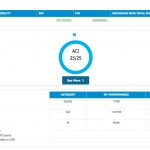RISE works through a software plug-in that maps to a practice’s electronic health record (EHR) system to collect patient care data (stripped of patient identifiers) after entry and allows the practice to analyze and track the data according to 20 quality measures. Currently, 327 practices and 797 healthcare professionals are actively submitting data to the RISE registry on more than 1 million patients and more than 5 million encounters. These are mostly from smaller private practices, but several large academic institutions are also connected to RISE or are working to connect to the registry, according to Dr. Kazi.
‘Effective quality improvement doesn’t have to be complicated; it can begin with a list of patients & a data point to track.’ —Dr. Desai
He and colleagues working with the RISE Registry recently reported on quality improvement performance of RISE practices, which showed that for six of nine measures for which CMS has set national benchmarks, the average performance of RISE practices exceeded targets.4

Dr. Kazi
Dr. Kazi is happy to see this successful performance data, and he is equally excited about the valuable patient data in RISE that can be accessed for research to improve rheumatology care. For example, among 40 practices sharing data with RISE, these practices began with a 20% rate of tracking disease activity in patients with RA and these same practices now have a 60% rate of tracking this quality measure. Dr. Kazi sees this as a clear indicator of increased activity around quality improvement activities that can directly improve patient care.
“Whatever you will measure you will improve,” Dr. Kazi says.
To those practices still pulling together resources to get improvement work underway, and to those who may be struggling in these efforts, he suggests taking a closer look at underlying cultural issues around improvement.
“Being successful with improving and sustaining quality is about knowing your DNA—look at your resources, look at your people, and look at the ways you hold your team members accountable for performance,” he suggests. “You have to get people really engaged in improvement work to get to that next level of truly achieving sustained higher quality.”
Carina Stanton is a freelance science journalist based in Denver.
References
- Von Feldt JM. Helping rheumatologists RISE in the era of MACRA. The Rheumatologist. 2016 Aug;10(8):8.
- American College of Rheumatology. RISE is ready for MIPS. 2017 Feb 16.
- Desai, SP, Lu B, Szent-Gyorgyi LE, et al. Increasing pneumococcal vaccination for immunosuppressed patients: A cluster quality improvement trial. Arthritis Rheum. 2013 Jan;65(1):39–47.
- Yazdany J, Bansback N, Clowse MEB, et al. Practice-level variation in quality of care in the ACR’s Rheumatology Informatics System for Effectiveness (RISE) [abstract 2985]. Arthritis Rheumatol. 2016;68(suppl 10).


